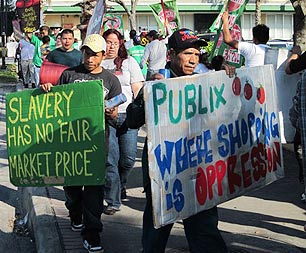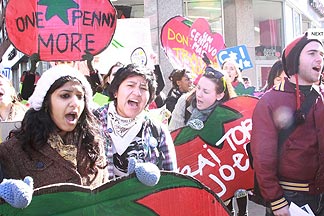Justice for tomatenplukkers: kom zondag naar Albert Heijn
Op 27 februari voeren tomatenplukkers uit Florida actie bij het Amerikaanse hoofdkantoor van Ahold in Boston. Ze willen dat Ahold-dochter Stop & Shop verantwoordelijkheid neemt voor fatsoenlijke arbeidsomstandigheden voor de mensen die de tomaten plukken die bij Stop & Shop in de winkel liggen.
In solidariteit zijn er ook in Nederland Pickets voor Albert Heijn:
In Amsterdam: Nieuwezijds Voorburgwal 226 (achter de Dam); 14.00 uur
In Den Haag: Grote Marktstraat 55 A (tussen/onder Bijenkorf en Hema); van 15.00 uur tot 16.00 uur
of in eigen plaats…

‘Wij, op de velden van Florida, plukken de tomaten voor Boston, en hebben dat jarenlang onder onvoorstelbaar moeilijke omstandigheden gedaan,’ zegt Leonel Perez van de Coalition of Immokalee Workers. ‘Maar deze dagen beginnen we een glimp te zien van meer menselijke omstandigheden, dankzij de campagne voor Fair Food. Maar Boston’s Stop & Shop supermarktketen, en haar moedermaatschappij Ahold, staan deze vooruitgang in de weg, en hun weigering om de lonen en arbeidsvoorwaarden te helpen verbeteren dreigt deze ongekende – maar nog steeds fragiele – vooruitgang in de mensenrechten op de velden te ondermijnen’.
De tuinarbeiders van Florida werken al decennialang onder zware omstandigheden, waarbij sprake is van hongerlonen en wijdverbreide schendingen van werknemersrechten, tot aan moderne slavernij toe. Maar de jarenlange campagne begint wat op te leveren. Bedrijven als Taco Bell, Burger King en McDonald’s hebben inmiddels afspraken gemaakt met de Immokalee Workers over betere arbeidsomstandigheden en vakbondsrechten. Ahold wil echter tot nog toe niet met de tomatenplukkers om de tafel.
Kom zondag naar Albert Heijn om de tomatenplukkers te steunen. Gebruik de onderstaande knop om via Facebook, Twitter en andere netwerken ook je vrienden en contacten op te roepen om hun solidariteit te tonen!
–
Vorig jaar werd Ahold al bezocht, samen met Reverend Billy, om ze om medewerking te vragen (zie
Verslag: http://www.indymedia.nl/nl/2010/08/68990.shtml
http://www.supermacht.nl/home-mainmenu-1/298?task=view
(Engels): http://www.ciw-online.org/
March to Stop Sweatshops: http://ciw-online.org/dotherightthing/boston.html
—————————–
 Achtergrond:
Achtergrond:
De tuinarbeiders van Florida werken decennialang onder zware omstandigheden, met inbegrip van hongerlonen, wijdverbreide schendingen van werknemersrechten, tot aan moderne slavernij toe. Maar de jarenlange campagne begint wat op te leveren. Er komt steeds meer steun voor de Fair Food beginselen van de CIW, met inbegrip van een cent-per-pond loonsverhoging, een strikte gedragscode, een systeem van coöperatieve klachtenafhandelingsprocedure, een gezondheids- en veiligheidsprogramma, en een leerprogramma voor werkers onderling.
Afgelopen november sloten de CIW en de Florida Tomato Growers Exchange (FTGE) een overeenkomst waarmee deze beginselen verbreid zouden kunnen worden tot meer meer dan 90% van de tomatenvelden in Florida. De invoering zal geleidelijk zijn, maar er hebben zich al concrete veranderingen voorgedaan.
Aholds dochter Stop & Shop weigert echter om haar bijdrage te leveren, en ondermijnt daarmee de kans dat de overeenkomst met de grote telersorganisatie echt gevolgen krijgt. Elke inkoper moet immers een bijdrage leveren – zijn penny per pond – om de loonsverhoging mogelijk te maken.
Want de telers hebben zich verbonden aan het doorgeven van de penny per pound die door de fastfood- of supermarktconcerns betaald worden. Als die penny niet komt is er ook niets om door te betalen. En een penny per pound brengt gemiddeld een loonsverhoging van rond de 70%. Het is juist de prijsdruk vanuit de grote ketens, stelt de CIW, die een belangrijke oorzaak is van de crisis in de landbouw van Florida. De Fair-Food campagne die door de CIW al een decennium gevoerd wordt en die steeds breder gesteund wordt in de Amerikaanse samenleving, concentreert zich met name op die verantwoordelijkheid.
De CIW schrijft: ‘Mensenrechten zijn niet gratis; er is een daadwerkelijke prijs verbonden aan het repareren van wat Ahold en andere grote inkopers als Ahold in al die jaren hebben helpen afbreken door hun inkoopmacht in te zetten om steeds lager prijzen te vorderen.
De druk om tegen steeds lagere prijzen te leveren heeft geresulteerd in een toenemende verarming van landarbeiders en in decennia van schandalige arbeidsomstandigheden, en het repareren van die zaken kan niet zomaar kosteloos. Andere belangrijke inkopers hebben zich verbonden aan het helpen repareren van de schade die zij hebben veroorzaakt en er is geen reden waarom het Ahold geoorloofd zou zijn om zijn aandeel in de verantwoordelijkheid te ontlopen.’
—————
In het Engels van CIW:
Farmworkers, Consumers to March on Downtown Boston Stop & Shop Demanding Fair Labor Standards for Farmworkers
Pressure mounts for Boston-based supermarket chain to sign Fair Food agreement with Coalition of Immokalee Workers in light of historic breakthrough with Florida tomato growers
Immokalee, FL (Feb. 7, 2011) – On Sunday, February 27th, farmworkers from Florida – the men and women who pick the tomatoes Bostonians eat from October to May every year — will be joined by consumers from across the Northeast in a march through downtown Boston to the Brigham Circle Stop & Shop store, where they will hold a rally to demand that the supermarket chain join a growing partnership among farmworkers, Florida tomato growers, and retail food giants aimed at ending decades of farm labor abuse in Florida.
What: “March to Stop Sweatshops,” farmworkers and consumers march through downtown Boston to call on Stop and Shop (Ahold USA) to do the right thing.
When: Sunday, February 27th, 1pm in Boston’s Copley Square.
Who: Farmworkers from the Coalition of Immokalee (FL) Workers, Slow Food president Josh Viertel, religious leaders, students, community activists from across the Northeast.
“We pick Boston’s tomatoes, and for years those tomatoes have been harvested in Florida’s fields under unimaginably harsh conditions,” said Leonel Perez of the CIW. “Today, however, we are finally beginning to see the first glimmers of more humane treatment at work, thanks to the Campaign for Fair Food. But Boston’s Stop & Shop supermarket chain, and its parent company Ahold, are standing in the way of progress, and their refusal to help improve farm labor wages and working conditions threatens to undermine the unprecedented – and still fragile – human rights advances that are just now starting to take root in the fields.”
Background:
Florida farmworkers have long faced brutal conditions in the fields, including sub-poverty wages, widespread labor rights violations, and even modern-day slavery. Today, however, there is hope on the horizon, thanks to the efforts of farmworkers, Fair Food activists, Florida tomato growers, and nine food industry leaders (including Stop & Shop competitor Whole Foods) who have joined in support of the CIW’s Fair Food principles, including a penny-per-pound piece rate wage increase, a strict code of conduct, a cooperative complaint resolution system, a participatory health and safety program, and a worker-to-worker education process.
Last November, the CIW and the Florida Tomato Growers Exchange (FTGE) signed an agreement to extend these principles to over 90% of Florida’s tomato fields. And though the implementation of that agreement is being phased in gradually over the course of this season and the next, many real, concrete changes have already taken root on some of the state’s largest farms.
Stop & Shop, however, is refusing to do its part, and if they have their way, the unprecedented farm labor transformation promised by the CIW’s landmark agreement with the FTGE would be significantly diminished. That’s because the solution to farm labor exploitation and abuse contained in the Fair Food principles depends on the participation of all the major purchasers of Florida tomatoes. Each buyer must contribute its fair share – its penny-per-pound – for the pay raise to reach its full potential. Each buyer must commit to direct its purchases to those growers complying with the code of conduct – and away from those who don’t – for working conditions to get better and stay better. In the words of the FTGE’s Reggie Brown, “Everybody in the system has to be invested for it to work.”
About the Coalition of Immokalee Workers:
The CIW (www.ciw-online.org) is a community-based farmworker organization headquartered in Immokalee, Florida, with over 4,000 members. The CIW seeks modern working conditions for farmworkers and promotes their fair treatment in accordance with national and international human rights standards. The CIW’s Campaign for Fair Food has won unprecedented support for fundamental farm labor reforms from retail food industry leaders. The Campaign for Fair Food taps the unique powers of all the elements of our country’s food industry:
-
of consumers, to demand the highest ethical standards for food production;
-
of food retailers, to use their tremendous buying power both to demand higher labor standards of their suppliers and help raise farmworkers out of poverty through a price that supports sustainable production;
-
of growers, to continuously improve their operations and meet consumer demand, keeping pace with an evolving marketplace, and,
-
of farmworkers, to help expose and fix the worst abuses and apply their unique knowledge toward modernizing, and humanizing, our farm labor system.